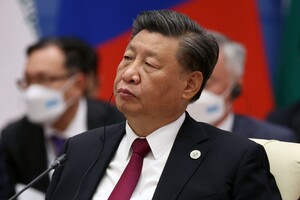The leader of China is trying to rally people around him with stories about the danger that threatens from all sides, experts believe.

In Beijing on October 16 the 20th Congress of the Communist Party of China was held – an event at which Xi Jinping can be re-elected for a third five-year term as the President of the People's Republic of China.
In a two-hour speech at the opening of the congress, Xi called for the acceleration of China's military and technological development, confirmed the readiness to use military force against Taiwan and called the policy of zero tolerance for covid a success.
The plans for the next five years also include: the development of science and education, the fight against corruption, the development of the state apparatus thanks to highly qualified personnel.
Xi called for strengthening the capacity to support national security by securing food and energy supplies, securing supply chains, improving disaster response capabilities and protecting personal information.
< p>In total, the words “security” and “security” appeared 89 times in his speech, compared to 55 mentions in 2017, writes Reuters. Instead, the use of the word “reform” dropped to 48 out of 68 mentions. of the day and be ready to withstand severe tests of strong winds and high waves,” he said.
Development army and investments in “security”
Xi Jinping said in his speech that China will strengthen the strategic capabilities of the armed forces to protect sovereignty.
“China will accelerate the development of world-class armed forces and strengthen its ability to create strategic deterrence potential”, he emphasized.
“We will work faster to modernize military theory, training of servicemen and weapons. We will build up strategic military potential,” Xi emphasized.
Taiwan and Hong Kong< /p>
The Chinese leader emphasized his readiness to use force to join Taiwan, but expressed confidence in the “peaceful resolution” of the issue.
“We insist on the pursuit of peaceful reunification with the greatest sincerity and best efforts, but we never promise to abandon the use of force and reserve the option of taking all necessary measures”, – said Xi Jinping.
In response, the office of the president of Taiwan noted that they will not give up sovereignty and will not go to compromises with China.
“Taiwan will not give up its sovereignty and will not compromise on freedom and democracy, and its people oppose Beijing's idea of governing Taiwan according to the model of “one country, two systems”, the message says.
Speaking about Hong Kong, where large-scale anti-government protests took place a few years ago, Xi noted that “the party guarantees national security, maintains social stability, protects people's lives and takes control of the situation in Hong Kong.”
COVID-19
Xi Jinping hardly touched on the topic of the fight against the coronavirus, only confirming the validity of the “zero COVID” policy, which made China a global outsider.
” We support the supremacy of the people and the supremacy of life, support the dynamic policy of “zero COVID” and have achieved significant positive results in the overall prevention and fight against the epidemic, as well as in economic and social development”, Xi said.
This approach involves betting not on vaccination, but on mass testing, tight restrictions and lockdowns in response to each disease outbreak. This policy hinders the development of the economy, the inflow of investments decreases, and unemployment increases.
Economy and technological development
Xi voiced support for the private sector and stressed that markets must play a key role as China perfects a “socialist economic system” and promotes “general prosperity”.
According to him, over the past ten years, the total volume of the Chinese economy has grown to 18.5% of the world economy.
“We must build a high-level socialist market economic system. Steadily strengthen and develop the system of state ownership, steadily encourage and support the development of the private economy, fully play the decisive role of the market in the allocation of resources and better fulfill the role of the government”, – he said.
The party also plans to make more efforts for the country's technological development and to strengthen food security and supply channels for industry, he noted. he.
“China will achieve technological self-sufficiency and power due to the development of the educational system and the invitation of foreign experts”, the Chinese leader emphasized.
Xi also promised a slow and steady end to the rise in carbon emissions.
The speech of the leader of the PRC clearly formulated China's path to decarbonization: China will not stop using fossil fuels until it is confident that clean energy can reliably replace them.
“We will work actively and balanced to reduce carbon emissions and achieve carbon neutrality. Based on China's energy resources, we will promote initiatives to reduce carbon emissions in a well-planned and step-by-step manner, in accordance with the principle of getting new before discarding old”, – he explained.
China is now the world's largest emitter of greenhouse gases, and two years ago Xi pledged to achieve carbon neutrality by 2060.
Read also: What order does China need and what disorder does Russia
International politics
According to Xi Jinping, “China's international influence, attractiveness and power to the world have increased significantly”.
“Faced with dramatic changes in the international landscape, we have maintained firm strategic resolve and demonstrated fighting spirit. We have protected China's dignity and core interests and maintained a good position for development and security,” Xi said.
China also denies the desire for global hegemony and expansion, the Chinese Embassy in Ukraine said following the results of the opening ceremony of the 20th CPC Congress.
“China will never seek hegemony and expansion, but will multiply such universal human values as peace, development, equality, justice, democracy and freedom”, the message says.
Related video
There was also no place in Xi's speech for the issue of Russia's invasion of Ukraine, which China stubbornly refuses to condemn.




